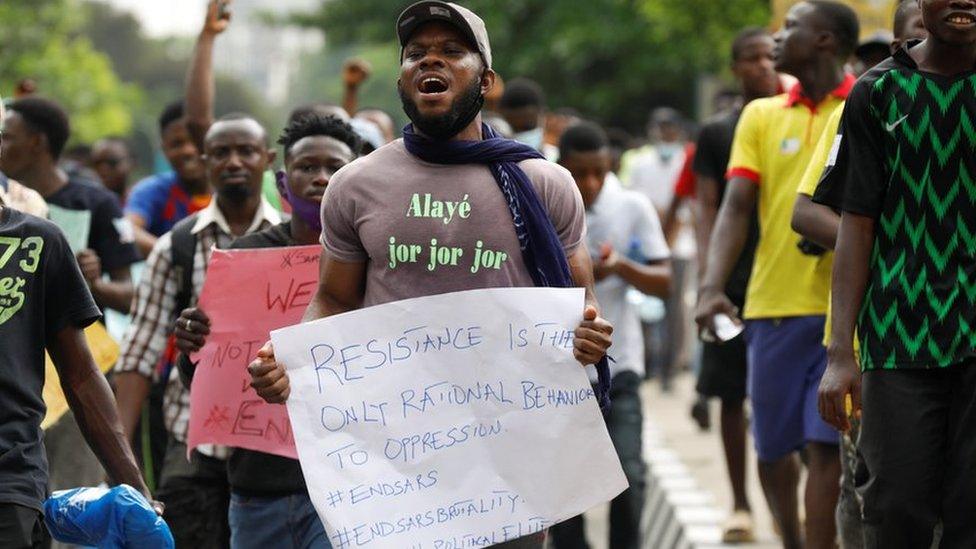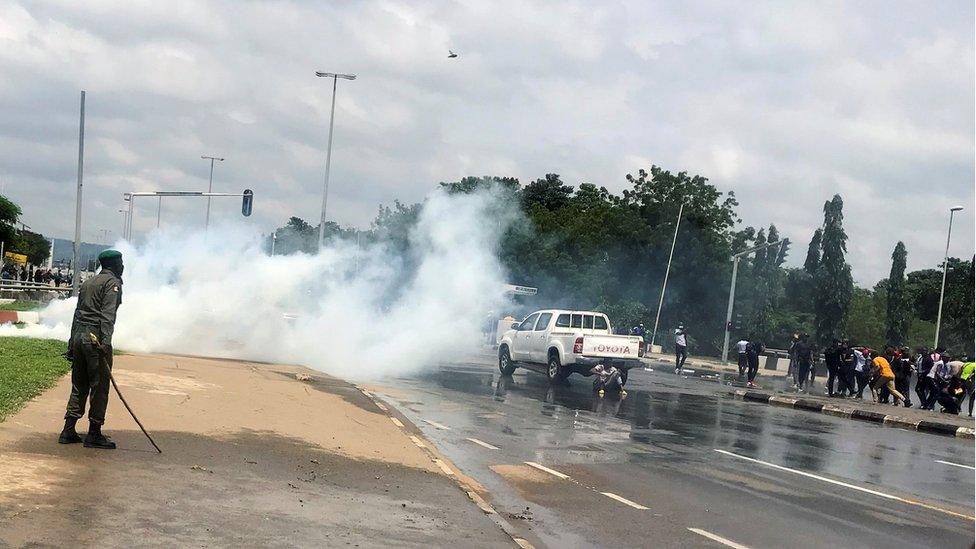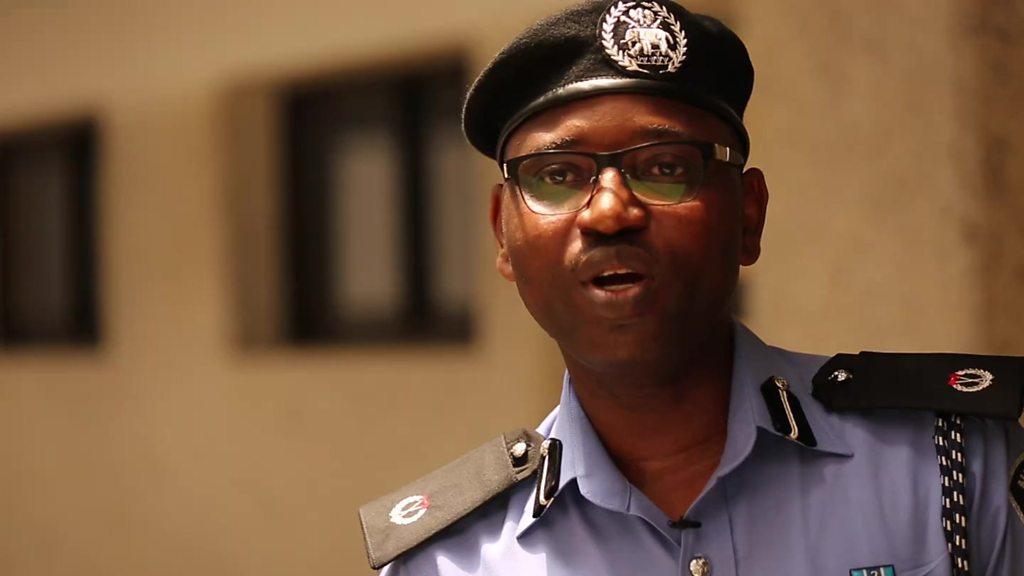SARS ban: Nigeria abolishes loathed federal special police unit
- Published

Sunday saw more protests, such as this one in Lagos
Nigeria has dissolved the special police force at the centre of protests against police brutality.
The government said a special presidential directive had ordered the immediate dissolution of the Special Anti-Robbery Squad (Sars).
Protests against the squad were sparked by a video of a man allegedly being killed by police.
The demonstrations have intensified despite a crackdown and have spread outside the country.
What does the directive say?
All the officers in the Sars squad - widely accused of unlawful arrests, torture and murder - are to be redeployed, the presidency said, and a new arrangement to replace the squad is being worked on.
Meanwhile, Nigeria's chief of police said a team of investigators - including civil society organisations and human rights bodies - would be set up to investigate alleged abuses by Sars.
Allow X content?
This article contains content provided by X. We ask for your permission before anything is loaded, as they may be using cookies and other technologies. You may want to read X’s cookie policy, external and privacy policy, external before accepting. To view this content choose ‘accept and continue’.

President Muhammadu Buhari had earlier said he was determined to end police brutality, introduce reforms and bring "erring personnel... to justice".
Protesters had demanded the unit be disbanded rather than reformed because previous commitments to change police behaviour had had no effect.


At first glance this seems like exactly what the protestors were calling for: the closure of the dreaded Special Anti Robbery Squad which has been accused of widespread rights abuses for years.
But there are worrying signs. The dissolution of Sars come came with one important specification: the officers from the controversial police unit will be redeployed. It's unclear where to. That's crucial because although the protest started off as a call to disband Sars, it has expanded to include the wider Nigerian police force.
Activists were quick to point out that the abuses carried out during the protests, including beatings, intimidation and the disproportionate use of force against demonstrators, were all carried out by policemen who did not belong to Sars.
For them, what's needed is a total overhaul of policing in Nigeria. It's also unclear whether any officers will be prosecuted for past abuses, something rights group Amnesty has said is crucial to ensure justice for the alleged victims.

How have the protests spread?
BBC correspondents in Nigeria say clashes between anti-Sars protestors and policemen have been growing.
Multiple eyewitnesses told the BBC they were beaten by police officers, as well as seeing others being attacked during protests on Sunday morning, Nigeria correspondent Mayeni Jones said.

Nigerian police have used tear gas and water cannon on protesters
A young woman who had strayed from the crowd at one protest told the BBC she had been beaten by 10 policemen who broke her glasses. A BBC reporter was also stopped by the police and her mobile phone broken by an officer.
Meanwhile the hashtag #EndSARS has been trending in Nigeria and globally, with demonstrations spreading to the UK and Canada.
Celebrities including the Nigerian superstars Wizkid and Davido, as well as British-Nigerian Star Wars actor John Boyega, have backed the protests on social media.
On Sunday protesters including Wizkid gathered in central London.
Allow X content?
This article contains content provided by X. We ask for your permission before anything is loaded, as they may be using cookies and other technologies. You may want to read X’s cookie policy, external and privacy policy, external before accepting. To view this content choose ‘accept and continue’.

Addressing the crowd he said the successful protest movement showed a "new Nigeria" where people would not be "scared to speak our mind again".
"Nigerian youth don't let anyone tell you you don't have a voice. We have achieved our goal - but this is just the beginning," he said.
How did Sars operate?
The latest round of protests were prompted by footage of officers pulling two men out of a hotel in Lagos into the street and shooting one of them.
The footage, leaked to the media, provoked outrage and led many to share stories of brutality attributed to the unit, which has developed notoriety for unduly profiling young people, the BBC's Nduka Orjinmo in Abuja says.
Those considered "flashy" often attract the Sars officers' attention and very few walk away without having to hand over money, while others are arrested or jailed on trumped-up charges and some have been killed, our correspondent adds.
Earlier this year rights group Amnesty said it had documented at least 82 cases of torture, ill treatment and extra-judicial execution between January 2017 and May this year.
The victims were mainly men aged between 18 and 35 from poor backgrounds and vulnerable groups. Many of those tortured were beaten with sticks and machetes and denied medical attention, the group said.
The "systemic use of torture... points to an absolute disregard for international human rights laws and standards", Amnesty said.
Why didn't reform work?
The #EndSARS hashtag was first thought to have been used in 2018, but it emerged once again a week ago.
There have been earlier attempts to reform the notorious squad. In 2018 Vice-President Yemi Osinbajo ordered that its management and activities be overhauled.
Then last year, a specially formed Presidential Panel on the Reform of the Special Anti-Robbery Squad recommended reforms along with the dismissal and prosecution of named officers accused of abusing Nigerians.
At the time, President Buhari gave the head of police three months to work out how to implement the recommendations, but critics say little changed.
- Published17 November 2016
